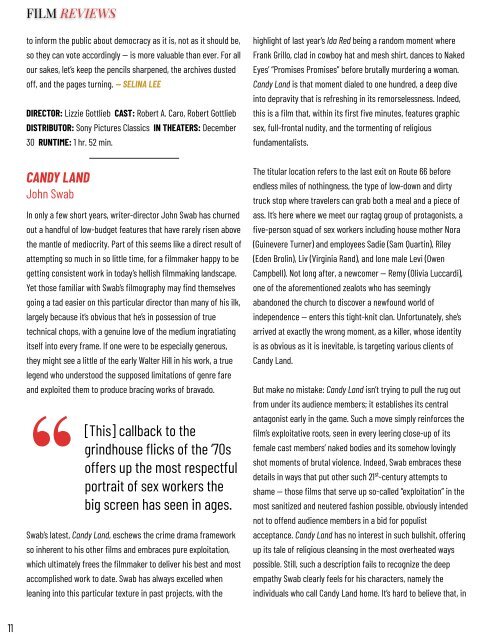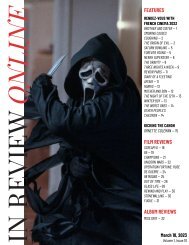InRO Weekly — Volume 1, Issue 1
You also want an ePaper? Increase the reach of your titles
YUMPU automatically turns print PDFs into web optimized ePapers that Google loves.
FILM REVIEWS<br />
to inform the public about democracy as it is, not as it should be,<br />
so they can vote accordingly <strong>—</strong> is more valuable than ever. For all<br />
our sakes, let’s keep the pencils sharpened, the archives dusted<br />
off, and the pages turning. <strong>—</strong> SELINA LEE<br />
DIRECTOR: Lizzie Gottlieb CAST: Robert A. Caro, Robert Gottlieb<br />
DISTRIBUTOR: Sony Pictures Classics IN THEATERS: December<br />
30 RUNTIME: 1 hr. 52 min.<br />
highlight of last year’s Ida Red being a random moment where<br />
Frank Grillo, clad in cowboy hat and mesh shirt, dances to Naked<br />
Eyes’ “Promises Promises” before brutally murdering a woman.<br />
Candy Land is that moment dialed to one hundred, a deep dive<br />
into depravity that is refreshing in its remorselessness. Indeed,<br />
this is a film that, within its first five minutes, features graphic<br />
sex, full-frontal nudity, and the tormenting of religious<br />
fundamentalists.<br />
CANDY LAND<br />
John Swab<br />
In only a few short years, writer-director John Swab has churned<br />
out a handful of low-budget features that have rarely risen above<br />
the mantle of mediocrity. Part of this seems like a direct result of<br />
attempting so much in so little time, for a filmmaker happy to be<br />
getting consistent work in today’s hellish filmmaking landscape.<br />
Yet those familiar with Swab’s filmography may find themselves<br />
going a tad easier on this particular director than many of his ilk,<br />
largely because it’s obvious that he’s in possession of true<br />
technical chops, with a genuine love of the medium ingratiating<br />
itself into every frame. If one were to be especially generous,<br />
they might see a little of the early Walter Hill in his work, a true<br />
legend who understood the supposed limitations of genre fare<br />
and exploited them to produce bracing works of bravado.<br />
“[This] callback to the<br />
grindhouse flicks of the ‘70s<br />
offers up the most respectful<br />
portrait of sex workers the<br />
big screen has seen in ages.<br />
Swab’s latest, Candy Land, eschews the crime drama framework<br />
so inherent to his other films and embraces pure exploitation,<br />
which ultimately frees the filmmaker to deliver his best and most<br />
accomplished work to date. Swab has always excelled when<br />
leaning into this particular texture in past projects, with the<br />
The titular location refers to the last exit on Route 66 before<br />
endless miles of nothingness, the type of low-down and dirty<br />
truck stop where travelers can grab both a meal and a piece of<br />
ass. It’s here where we meet our ragtag group of protagonists, a<br />
five-person squad of sex workers including house mother Nora<br />
(Guinevere Turner) and employees Sadie (Sam Quartin), Riley<br />
(Eden Brolin), Liv (Virginia Rand), and lone male Levi (Owen<br />
Campbell). Not long after, a newcomer <strong>—</strong> Remy (Olivia Luccardi),<br />
one of the aforementioned zealots who has seemingly<br />
abandoned the church to discover a newfound world of<br />
independence <strong>—</strong> enters this tight-knit clan. Unfortunately, she’s<br />
arrived at exactly the wrong moment, as a killer, whose identity<br />
is as obvious as it is inevitable, is targeting various clients of<br />
Candy Land.<br />
But make no mistake: Candy Land isn’t trying to pull the rug out<br />
from under its audience members; it establishes its central<br />
antagonist early in the game. Such a move simply reinforces the<br />
film’s exploitative roots, seen in every leering close-up of its<br />
female cast members’ naked bodies and its somehow lovingly<br />
shot moments of brutal violence. Indeed, Swab embraces these<br />
details in ways that put other such 21 st -century attempts to<br />
shame <strong>—</strong> those films that serve up so-called “exploitation” in the<br />
most sanitized and neutered fashion possible, obviously intended<br />
not to offend audience members in a bid for populist<br />
acceptance. Candy Land has no interest in such bullshit, offering<br />
up its tale of religious cleansing in the most overheated ways<br />
possible. Still, such a description fails to recognize the deep<br />
empathy Swab clearly feels for his characters, namely the<br />
individuals who call Candy Land home. It’s hard to believe that, in<br />
11

















